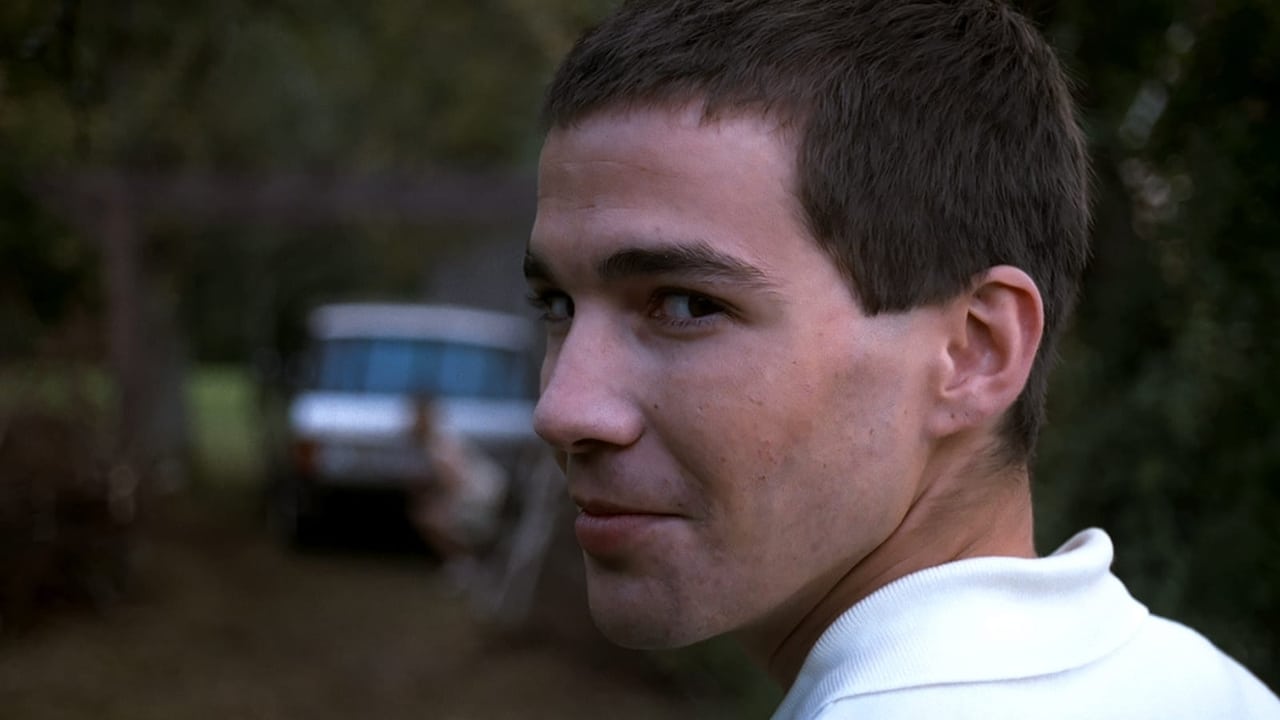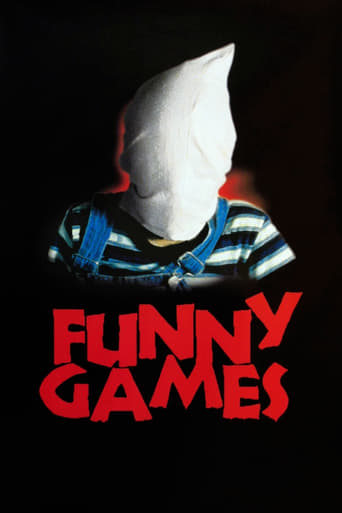

Such a frustrating disappointment
... View MoreThe acting is good, and the firecracker script has some excellent ideas.
... View MoreThe biggest problem with this movie is it’s a little better than you think it might be, which somehow makes it worse. As in, it takes itself a bit too seriously, which makes most of the movie feel kind of dull.
... View MoreIt really made me laugh, but for some moments I was tearing up because I could relate so much.
... View MoreAnyone who has ever seen a Michael Haneke film will know he can provide a near to perfect, yet challenging piece of cinema and Funny Games is perhaps just a close to perfection like any of the other films which he made that I have seen. You will not hear me complain about the fantastic acting, cinematography, pacing, editing et cetera et cetera. The reason why Funny Games does not receive a ten star rating like Caché, Das Weisse Band or Amour did, is because of Haneke's intention for making it. He made this film where two sadistic young men capture and torture an upper-middle class family because he wanted to make the audience aware of the fact that we enjoy this types of cruel movies. This cruel film is an essay, stating that audiences revel in the torture of innocent fictional characters. And from what I could glean from the actual essay he wrote on the film, there is also some commentary in there about the role of violent media in a violent society, but I will not follow him down that rabbit hole just yet. Let's for now stick with his primary message. I will never deny that audiences don't enjoy violent or even cruel movies. I myself am an enormous fan of all kinds of horror, be it slocky gore fests or serious suspense filled dramatic thrillers. Funny Games is not a horror movie. It is an art film, wearing the mask of a horror film, which it pulls of halfway through, so it can accuse us of enjoying the sick imagery on screen. Through the various fourth-wall breaks the killers interact with us, asking for our opinion and approval, as to say that we are the ones causing all this. We are not Mr. Haneke. Nobody forced you to make a horror film. Just like nobody is going to force me to like your pretentious accusations. And note that when I use the word pretentious I am not referring to the filmmaking, but to the intention of the filmmaker. Funny Games is an expertly crafted insult to the audience for liking a genre of movies the director does not. The film could have been great, but its downfall lays in the fact that it thinks it is better than its colleagues. Now if you will excuse me, I am going to watch a dumb, gory horror flick, and enjoy myself.
... View MoreI'm a great fan of Naomi Watts, so when I saw Funny Games from 1997, I could not resist watching a remake immediately. After a few minutes, I realized that this is not a classic remake, but literally to the detail the same movie, only shot at another location and with the other set of actors. Ok, they've changed dog breed and cell phone and kitchen appliances are more modern, but everything else is identical. Every scene, every cadre, every word. I do not understand why Haneke had the need to do something like this, without even trying to bring at least a little original spirit into this remake. After fifteen minutes I got bored, so , out of love for Naomi, I just skipped to the key points and watched the most important scenes. At first I was sorry I did not watch the remake first, because of Naomi of course, but I soon discovered that I did not make a mistake because the original is somewhat better.Funny Games is a psychological thriller/horror, which shows the family on vacation in the middle of nowhere. A couple of young sociopaths break into their house and start a psycho-physical terror. Story is solid, with no big holes and illogicality, and shows the situation very realistically. The directing is excellent and manages to build an extremely stressful atmosphere completely without explicit scenes, with this tension somewhat stronger in the original. As far as acting is concerned, it's hard to say which cast is better overall. Although Michael Pitt is really creepy, Arno Frisch and Frank Giering are much better in roles of young sociopaths. On the other hand, Naomi Watts is slightly better Anna than Susanne Lothar, while Tim Rot completely overshadows Ulrich Mühe from the very start.!!! SPOILER ALERT !!!All in all, this more than a solid thriller, with a strong atmosphere that kept me on the edge of the seat, would have earned a strong eight, maybe even nine, if Haneke did not come to a totally moronic idea to add a "fourth dimension", i.e. direct communication with the audience. On several occasions we have freezing of the image, actors talking to the audience, and on top of everything, one of the characters takes the remote control in the middle of denouement, rewinds the movie few minutes back, and then movie takes completely different direction. This kind of scene is suitable only and exclusively in comedies, and even there it's outworn, but for a serious psychological thriller it is a complete deal-breaker and spoils overall impression to seven tops. Due to a certain difference in the atmosphere of the original and the remake, I give them half a score up and down.1997. - 7,5/10 2007. - 6,5/10Arno & Frank - 8/10 Naomi & Tim - 9/10
... View MoreFunny Games is a unique beast. I cannot think of a movie that can be compared to it's gut- punching themes; the best I can do is compare it to the Blue Eye Brown Eye Experiment conducted by Jane Elliot. If you don't know what this is, it's a social experiment that involves the separating of a group into 2 segments: blue eyed people and brown eyed people. Jane has the blue eyed group exit the classroom and then instructs the remaining brown eyed group that they supersede the blue eyed group in terms of look, intelligence, worth etc. This experiment, at times being praised as daring yet necessary, put many people in tears throughout the 40-some odd years that Jane has been conducting it. Outrage, trauma, people exclaiming "I'm not racist and I have never treated anyone like this" infuriated at Jane. The experiment's core purpose was to untangle the socialized racism that so many people have been complacently conditioned to appropriating. Funny Games works in the same fashion: you are not in control and the antagonists make that quite clear from the time the begin tormenting the family on screen. Unlike vacuously violent and hollow films of recent years such as Martyrs & Eden Lake; which themes rely on sadism, hopelessness and doubt, Funny Games shakes it's finger at you and reminds you that what you are seeing in front of you is the same thing that you go to for entertainment: violence.. the only difference is that you don't get to casually "hurraw" to your TV screen while you watch masked vigilantes beating the drug dealer with a brick to the sound of Led Zeppelin; instead, you get cunning, callous silence with the haunting echos of whimpering while Peter and Paul stay consistently composed which for whatever reason makes each minute more agonizing than the last. Is it pleasant? Not at all. Is it entertaining? Hell no. Does it serve it's purpose? Absolutely. This is a film I could not bring myself to watching. With that sad, I was devastated after watching it; but it was devastation myself rather than what I had seen. I reflected on all the times I watched violent television/movies and treated it as if it was just a part of the entertainment turnstile; I need my fill of violence to enjoy something. After Funny Games, I steered my direction toward movies that will not make light of the seriousness that violence can bring. Even films like 21 Jump Street give me that 'what am I doing?' feeling. This film is punch in the face followed by being sent to the confinement chair of shame. It will probably change you, but in way that you will feel thankful for further down the road.
... View More"The funny games" is a punch in the stomach, and we deserve it, it is to believe it will be just another one of those horror clichés filmezinhos family goes to home away from home, is a psychopath ... no, not here, the great director michael Haneke wants you to take, here we see a family being tortured physically and psychologically for anything, this family is our reflection to junk consumismos because the film is a paradox, it really is like a movie, complete with breaks and scenes of setbacks, including the breaking of the fourth wall, and who is watching this movie? us and the family. It is a brilliant critique, including the most important scene in the film, the first camera angle is to show the TV bloody, Haneke is very symbolic, complex and intelligent in his criticism because he does not want to criticize for you to forget here the 1 week, no, Haneke puts heavy scenes, though not explicit, but they need not be explicit, because you will not forget the film so soon. Technically the film is very good, with clear references to mechanical orange, Haneke tries to build DeLarge Alexander 90s, he can not, but Peter is a spectacular character, he breaks the fourth wall, it handles the film handles peter and handles They, in fact, all the performances are great, with an extremely clean photo and a sensational soundtrack, showing classical music and counterpoint with Heavy Metal. Here we have a remarkable quality film with a very intelligent and technically very effective criticism, it is worth taking that punch in the stomach.
... View More